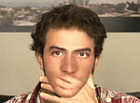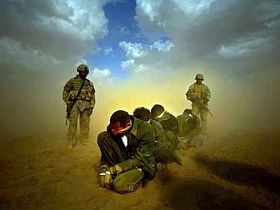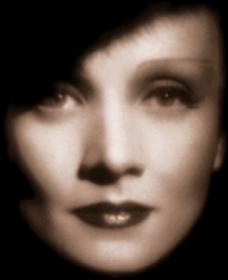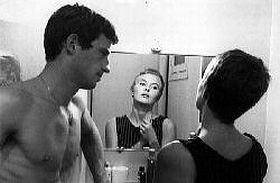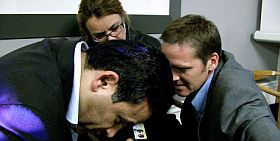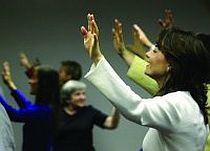Godards “En gift kvinde”, som jeg fandt et klip fra på You Tube, kunne jeg ikke sådan lige her og nu finde som dvd, men, men den første lange spillefilm, den måske vigtigste trods alt, og den kendteste nok, “Åndeløs” havde jeg en VHS-kopi af fra svensk tv. Og sandelig! På biblioteket havde de en dvd.
Det er så mærkeligt og så godt, at netop den film findes på dvd med danske undertekster, et ungt og sprællevende og stadigvæk urovækkende filmværk. Findes i udlån på en række biblioteker, kan bestilles på alle. Og så er den jo en milepæl i filmkunstens udvikling. Den gjorde den nye franske bølge af filmkunst i 1950’erne til uomgængelig og umistelig kendsgerning, film kunne nu have en auteur, som romaner og malerier hang de sammen med et enkelt menneskes tænken, som billedet med malerens, som teksten med forfatterens. Kameraet var filminstruktørens pen, sagde man ustandseligt, efter den franske instruktør Alexandre Astruc i en artikel i 1948 havde formuleret det i overskriften. Det er også titlen på Christian Braad Thomsens vigtige bog om Godard og fire andre franske instruktører fra tiden, Jacques Rivette, Eric Rohmer og Francois Truffaut. Sådan skriver han om Godards og Truffauts første film:
“En sammenligning mellem Godards og Truffaut debutfilm, den klassisk-helende ‘Ung Flugt’ og den oprørsk-destruktive ‘Åndeløs’ vil kunne belyse, hvor Godards indsats lå. Sammenligningen er så meget mere nærliggende, fordi ‘Åndeløs’ er baseret på en synopsis af Truffaut.
Godards “En gift kvinde”, som jeg fandt et klip fra på You Tube, kunne jeg ikke sådan ligr her og nu finde som dvd, men, men den første lange spillefilm, den måske vigtigste trods alt, og den kendteste nok, “Åndeløs” havde jeg en VHS-kopi af fra svensk tv. Og sandelig! På biblioteket havde de en dvd.
Det er så mærkeligt og så godt, at netop den film findes på dvd med danske undertekster. Findes i udlån på en række biblioteker, kan bestilles på alle. Den er et ungt og sprællevende og stadigvæk urovækkende filmværk. Og så er den jo en milepæl i filmkunstens udvikling. Den gjorde den nye franske bølge af filmkunst i 1950’erne til uomgængelig og umistelig kendsgerning, film kunne nu have en auteur, som romaner og malerier hang de sammen med et enkelt menneskes tænken, som billedet med malerens, teksten med forfatterens. Kameraet var filminstruktørens pen, sagde man ustandseligt, efter den franske instruktør Alexandre Astruc i en artikel i 1948 havde formuleret det i overskriften. Det er også titlen på Christian Braad Thomsens vigtige bog om Godard og fire andre franske instruktører fra tiden, Jacques Rivette, Eric Rohmer og Francois Truffaut. Sådan skriver han om Godards og Truffauts første film:
“En sammenligning mellem Godards og Truffaut debutfilm, den klassisk-helende ‘Ung Flugt’ og den oprørsk-destruktive ‘Åndeløs’ vil kunne belyse, hvor Godards indsats lå. Sammenligningen er så meget mere nærliggende, fordi ‘Åndeløs’ er baseret på en synopsis af Truffaut. ‘Ung flugt’ er en hyldest til livet, Antoine Doinel flygter fra en voksenverden, han ikke kan trives i, men så langt fra at være opgivende, er hans udbrudsforsøg hele tiden fulde af håb, og da han til sidst under sin afgørende flugt når frem til havet, har han nået sine drømmes mål – også selv om hans forfølgere er lige i hælene op ham.”
I ‘Åndeløs’ er denne helende alvor sprængt og blevet til ironi: “Amatør-gangsteren Michel Poiccard (Jean-Paul Belmondo) dræber under flugt en politibetjent og forsøger at overtale sin elskede Patricia (Jean Seberg) til at flygte sammen med sig. Hun vakler og til sidst afprøver hun sine følelser på en uskyldigt-brutal måde, som skal vise sig karakteristisk for Godards kvinder: kan hun angive ham til politiet, elsker hun ham næppe. Og det kan hun, men alligevel vakler hun og giver ham mulighed for at flygte. Da han ikke kan få hende med, er hans sidste flugt dog kun på skrømt: han lader sig skyde ned af politiet.”
“Everything is Cinema” er titlen på en ny, stor bog om Godards arbejdsliv, en biografi bygget på omfattende analyser af filmene, og det kan netop her ikke være anderledes, for i Godards liv er alt film og det er, ser det bestemt ud til, alt sammen med i filmene, ingen opdeling i arbejdsliv, politisk liv, venskaber og forelskelser og to ægteskaber. Bogen er skrevet af Richard Brody fra tidsskriftet “The New Yorker”. Af dens mange vurderinger af lige netop “Åndeløs” vælger jeg lige nu den her:
“The shooting of ‘Breathless’ took place in conditions that were in many respects unprecedented in the history of cinema. Godard was aware of their peculiarity; indeed, he would make sure that his way of making the film would be as much a part of its public identity as the story and the actors. Godard’s novel method was not only the practical springboard for his formal and intellectual inventions, it was part of them. ‘Breathless’ would be an ‘action film’ in the sense of ‘action painting’: the act and the moment of making the film were as much a part of the work’s meaning as its specific content and style. As such, it would be the first existentialist film.”
Jean-Luc Godard: Åndeløs, Frankrig, 1959, 86 min., dvd med danske undertekster. Sandrew Metronome, 2007. 59 biblioteker har filmen i den version. Christian Braad Thomsen: Kameraet som pen, København, 1994, 473 sider. Richard Brody: Everything is Cinema, New York, 2008, 707 sider.




